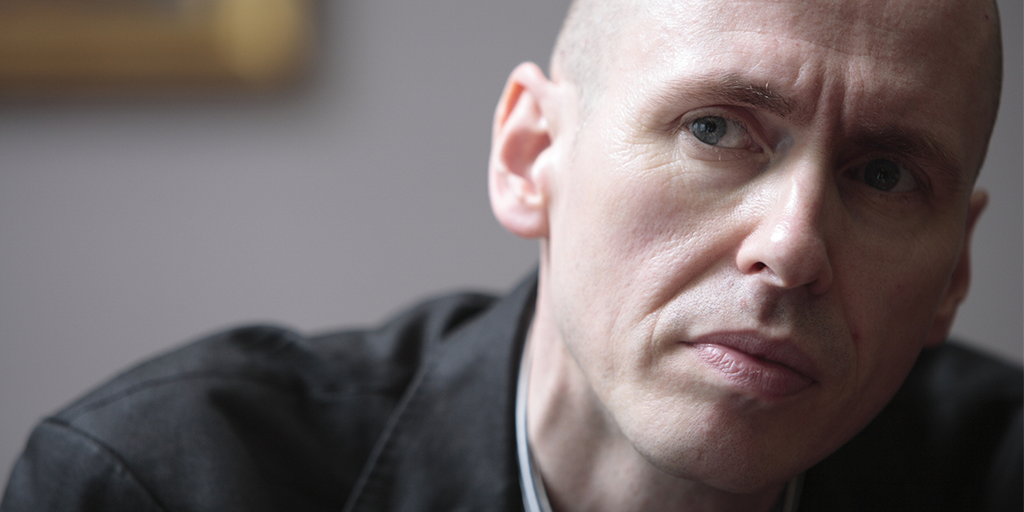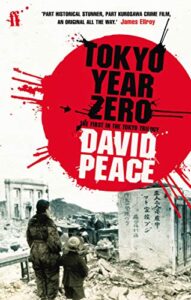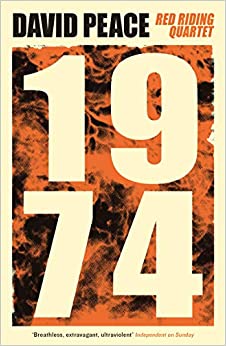
David Peace is probably most well-known for The Red Riding Quartet – a four-novel chronicle based on the decade prior to 1984 when the Yorkshire Ripper, corruption and hyper inequalities ravaged the hinterland of the Pennines. It was made into multi-award winning TV drama and broke the acting careers of Andrew Garfield and Rebecca Hall. But his other novels are equal literary giants: GB84 recovers the undeclared civil war following years of high inflation and the breaking of the unions’ power and industry – and the communities which built the UK. There’s the two histories on football legends, Red or Dead and The Damned United, and Patient X, the meditation on Japanese short story writer, Ryunosuke Atukagawa followed by the Tokyo Trilogy: Tokyo Year Zero, Occupied City and, most recently, Tokyo Redux.
Not only does Peace’s work span decades, cultures and literary techniques, he repeats his intense process of production time and again to create polyphonic tomes. Undaunted by raw unfiltered detail, he focuses on the most culturally relevant detail (Frankie Goes To Hollywood’s Two Tribes, Soviet food boxes full of, as I recall, revolting spam and canned apple, brown dust masquerading as coffee – yes, starvation will make you stoop that low) and patterns, rather than literal fact. Peace seems to be creating a song from the noise. Some feel frustrated by a crime novel with no resolution, but the neat ending is not Peace’s aim. It’s not resolution but the deconstruction of myth, allowing the reader to see the processes of crime within time and place. Peace’s disassembling of history is fearless: nothing is sacred but truth.

In a time of overblown soundbites and memes, his paragraph-free prose of pattern, rhythm and voice create an intimate link with the reader. Reading Peace’s novels is like a meditation or litany; it’s not so much the content you remember, but the steady pattern, the steady removal of artifice. While there is a whole subgenre of Ripper lit, none produce the scorching analysis, at once panoramic and microscopic, of Peace’s Quartet. He is the conductor of this polyphony – and it is a polyphony, an entirely new sound made up of many different sounds – which has such a visceral impact on the reader. The resolution, if there is one, is finally seeing a thing for what it is.
Peace grew up in the North of England in the 1970s, when the UK music press was the forge for a new critical culture, where readers could engage in ideas as diverse as comics, cult films, new musical forms and radical underground politics. Music, particularly the ‘press’ that introduced it, created an alternative collective cultural common made up of an intricate network of news bulletins, lyrics, fanzines, rival weeklies and monthlies such as NME, Melody Maker, Record Mirror. It was always polyphonic and formed the conversation which nourished and built up an entire culture as well as subcultures. Music is not that anymore, commodification having removed that liminal space music provided. Music is no longer the soundtrack of the twenty first century; crime is. We understand ourselves through crime – not music – now.

And Peace gets this. From the rhythmic ‘ton-ton’ in his Tokyo novels, the repetitions, and rhymes in GB84 and Red Riding, the patterns and refrains, his novels are curated like albums. It is this talent for obsessive cultural detail and rhythm which allows him to recreate news events from the past, handling time like a camera: panning out, zooming in, cutting across, reframing, cutting. These techniques become a moral filter for undigested fragments of history leaving the true patterns and rhythms of ‘what went wrong’. His novels occupy that haunted space previously occupied by music journalism of the 1970s-80s, a place that is curious, in stark defiance of its context, that creates perspective, stranded between the past and an unreachable future.
The paradox of Peace’s unresolved crime fiction is that its effect on the reader is surprisingly calming. It shouldn’t be but there is no one left to hate. Like an expert watchmaker, Peace carefully dismantles time in such a way that the reader can finally see it, and themselves, clearly. Crime fiction should entertain but, if it doesn’t also bring insight, it’s just fodder for the same ghoulish appetites mainstream media serves. Crime fiction goes where the true crime documentary can never go: the collective cultural subconscious, pulling at threads and nuances abandoned as flotsam, enabling the reader to make connections and see the whole through the specific. If more people in the UK had read GB84 instead of The Da Vinci Code, we would not be reliving it now. If more people in Japan had read Tokyo Redux, maybe the events of this summer need never have happened.
Reading a David Peace novel feels sacred, a space where you can retreat into some dark, quiet place to examine indignities. Many crime novels are page-turners, but few resonate on such a deep level. Peace is Dickens for our times of crime.
It was such a privilege to interview him for Noirwich 2022 and ask him about his process.
NB: How long does your research take and how do you fit your writing round it?
DP: At one time, I would have said it was roughly a year of research and a year of writing – though it was never quite as clear cut as that – but the research now seems to just take longer and longer. Tokyo Redux, in terms of both research and writing, took over ten years, and went through three very different drafts, but it was also interrupted by writing Red or Dead and Patient X (though that book had been ongoing for some time). But as I’m researching, characters and scenes are coming to mind from the material I am researching, and so there are notebooks of both research and of writing and, at some point, hopefully, the writing just takes over from the research. Not to be too pretentious, or mystical about it, but the research is ‘the key to the door’, and at some point, the research enables me to step through that door into the world – the time and the place – I want to write about.
NB: You studied Japanese short story writer Ryunosuke Akutagawa and it is clear structure and repetition is an important technique of yours. To what extent do you think Japanese writers have allowed you to develop the uniquely intricate yet sturdy structures of your historical crime fiction?
DP: Japanese literature was first and foremost a way to help me try to learn about the country I was (and still am) living in. I was always fascinated by the history of Tokyo, in particular, and then, as I began what became the Tokyo Trilogy, novels, poetry, plays – along with music and film – became a way to learn about, and try to ‘imagine’ post-war Tokyo; keys to the doors again. In particular, Kafū Nagai, Osamu Dazai and Ango Sakaguchi were very influential in the writing of Tokyo Year Zero and Akutagawa, too; a quote from Akutagawa starts Tokyo Year Zero, the structure of his short story ‘In a Grove’ suggested the structure for Occupied City, and the character of Kuroda Roman in Tokyo Redux echoes traits of Akutagawa himself. I also read and re-read a lot of Japanese crime fiction, too: classics such Edogawa Rampo, Seishi Yokomizo and Seichō Matsumoto, but also more recent writers such as Natsuo Kirino, Hideo Yokoyama and Kaoru Takamura. And so I am sure the influence of many, many Japanese writers is present in my writing.
NB: In the light of the recent shooting of Japanese PM, Shinzo Abe, do you think the Tokyo Trilogy could one day become a quartet, like Red Riding?
DP: Well, originally, it was going to be a quartet, and I would like to write about Japan again, at some point. But in many ways, the shooting of the former PM Abe is very much connected to the events and history covered in Tokyo Redux; the roots of this killing go back to Abe’s grandfather and his links with the Unification Church, the CIA and various Japanese right-wing groups and fixers, all of which were collaborating in trying to halt the post-war rise of Communism within Japan.
NB: All your novels are liminal, on the edge of becoming something else. What do you think that ‘something else’ will be in our current myopic times? Are there any writers you feel are creating a new structural form for historical crime?
DP: I believe crime fiction has the potential, and the obligation and responsibility, to be the great moral literature of our times, seeking to understand why crimes take place in particular times and particular places. And so, I am always seeking to try to better fulfil that potential and obligation. In this quest, I was and still am inspired by Jean-Patrick Manchette, and by Ted Lewis and Derek Raymond, and by Dashiell Hammett and James Ellroy. And I am always looking for books and writers who are pushing the boundaries of what “crime fiction” can be, and so, for example, I greatly admire Drive Your Plow Over The Bones Of The Dead by Olga Tokarczuk; Hurricane Season by Fernanda Melchor [and which was recommended to me by Tom Benn who, himself, is pushing the boundaries of crime fiction]; Bad Penny Blues by Cathi Unsworth; The Treatment by Michael Nath; Brazilian Psycho by Joe Thomas; and in Japan, Out and Grotesque by Natsuo Kirino; 64 and Seventeen by Hideo Yokoyama; and the recently translated Lady Joker by Kaoru Takamura. In short, read a lot, write a lot!
NB: Your ability to create a polyphonic whole out of so many disparate but distinct voices is incredible. How do you find your voice(s)?
DP: That’s very kind of you to say so, Nina, thank you. As I’ve just said above, reading and writing a lot is important. I spend a lot of time ‘practicing’ writing, experimenting, and trying to improve. But, ultimately, I think the voices are born from the research, from stepping through that door, and then just listening, trying to hear and record the voices of the victims, the voices of the dead …
Nina Bhadreshwar is a writer and illustrator, usually doing beauty and music editorials on both sides of the Atlantic. She has been writing crime fiction in secret for decades and has just finished her first crime fiction novel for publishing at UEA.
@ninabhadreshwar (Instagram)
Website: www.bhadpublicity.com
On the hunt for exhilarating new crime fiction reads this autumn? Enter the Noirwich + The Crime Vault book bundle giveaway competition!
Read more ⟶We were honoured to welcome the award-winning Soviet-Ukrainian American and French novelist and artist Yelena Moskovich for the annual Noirwich lecture 2022. Read a transcript of their lecture here.
Read more ⟶UEA MA Crime Writing Graduate Helen Marsden reviews our 2022 event 'Murder Most Modern' with Scarlett Brade and Bella Mackie.
Read more ⟶UEA MA Crime Writing Graduate Helen Marsden reviews the Noirwich Lecture 2022, delivered by Yelena Moskovich.
Read more ⟶
The Crime Vault

Waterstones

National Centre for Writing
